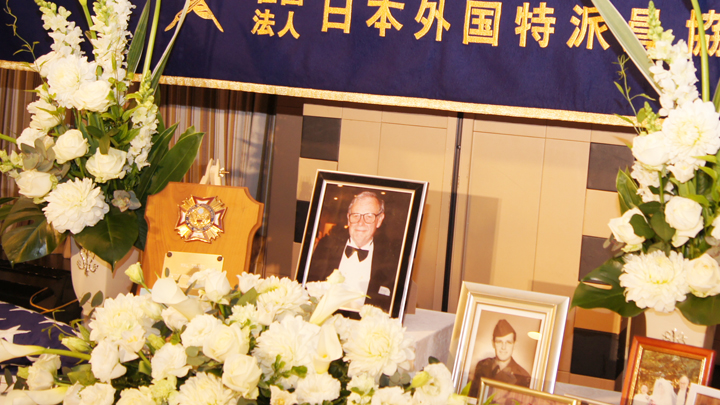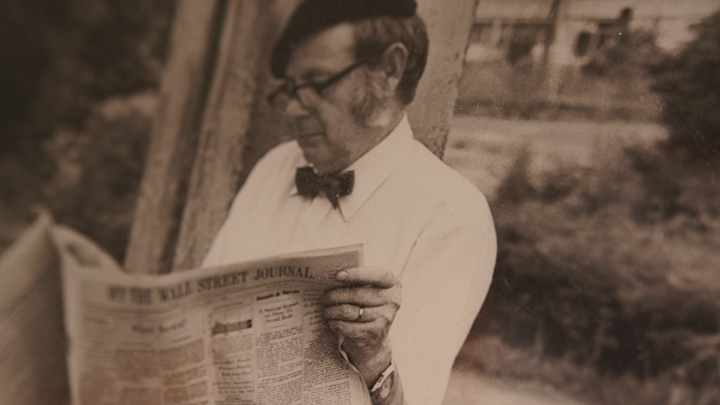パシフィック異文化教育ランゲージアカデミーPacific Cross-Culture Language Academy(PCLA)
ネットワードインターナショナルサービスNetword International Services Pty Ltd.
ハル A.ドレイク【追悼お別れ会 | a memorial and farewell party】

c)メッセージ朗読:
リチャード・パイル(Associated Press[AP通信])
Hal Drake
25 February 2013
Dear Kaz,
Please accept sincerest condolences from Brenda and me on Hal’s passing.
Mr. and Mrs. Drake were great friends of ours in Tokyo in the 1980s, and your presence as one of the FCCJ’s beautiful couples always enriched the social scene there. Hal was a great raconteur and observer of the human race, in both his writing and in those wide and deep rivers of conversation in the Main Bar.
We hope you find comfort in knowing that you have friends who loved you then and can treasure the memory of those times, though now tempered by the sadness of inevitable loss.
In a strange way I saw myself in Hal, for as a 21-year-old GI in a Signal Corps unit at Hardy Barracks in Roppongi in 1955-56, I applied for a job at Stripes and miraculously was able to get the civilian editor, Gene Miller, to accept me _ on condition that I could arrange my own
transfer. Unfortunately, the crusty M/Sgt for whom I worked didn’t like draftees, and after listening to my pitch that I could be of more value to the Army as a Stripes reporter than a company clerk, he smiled sympathetically and tore my application to pieces.
Otherwise I might have become another happy camper at S&S, learning my journalist’s craft from the guy at the adjoining desk, Hal Drake.
I know I told this story to Hal (probably more than once), so you must have heard it, too.
This message was delayed until I could get your resettled address from Steve Stibbens. It comes with our hopes, Brenda’s and mine, that you are finding friends and all else needed to ease your way.
From Richard and Brenda Pyle
When I first learned, in a flurry of e-mails from former colleagues in Asia, that Hal Drake had died, it marked another loss in what had already been a rather depressing year.
Since Feb of 2012, I had seen the passing of five former AP colleagues from the Saigon bureau where I had spent five years during the war in Vietnam. Among those five, Roy Essoyan and Ed White had also been important figures in journalism in Japan, both in AP’s Tokyo bureau and as active members of the world’s greatest press club.
Having had the sad honor of writing the AP obituaries for all of those five, I was seized by the impulse to write one for Hal Drake as well.
But that was better left to our great friend Geoff Tudor, with memories contribute by others who had also been close to Hal. I was proud to share in that.
These days, life expectancy is such that any one of us may outlive all the people we know and leave no one to write the obituary or eulogy.
Hal Drake was 83 when he died and it did occur to me that after 25 or 30 years there would be few people left at the FCCJ who had known him and could recall some of those nights of well-lubricated story-telling around tables in the Main Bar.
There’s a lot to say about the special aspects of Hal’s journalism, including the history that some of you know – of how we had to fight to get Hal Drake accepted as a regular member of the FCCJ because he worked for the US military newspaper Stars and Stripes.
The irony in that was that Stripes was an unofficial publication, and some of the resistance came from members employed by Soviet and other news agencies and newspapers – that were wholly owned, controlled and subsidized by their governments.
In the end, as always happens at the Tokyo press club, common sense prevailed. Hal became a member, and proceeded to lend his unique voice to the Main Bar table talk, possibly even elevating it somewhat. And of course he was always accompanied by the beautiful, effervescent Kaz, who brought her own special presence to every gathering.
I don’t mean to suggest that was his only contribution. Hal was a serious journalist and observer of the human condition. He was smart, with a lot of heart. And in his years in Tokyo, he wrote at length, and with a solid grasp and clear understanding, about both contemporary Japan and its history.
Through our friend Aritake-san and the good graces of the FCCJ library, I was sent copies of two of his memorable stories. One, from April of 1976, was an interview with Jiro Horikoshi, the designer of the legendary Zero fighter. The other was about the Hiroshima maidens, in which the allegedly hard-bitten reporter admitted that he was in tears covering the story.
From the other side of the world, we salute Hal Drake’s memory, send our love to Kaz and our best wishes to all at the great Foreign Correspondents Club of Japan.
